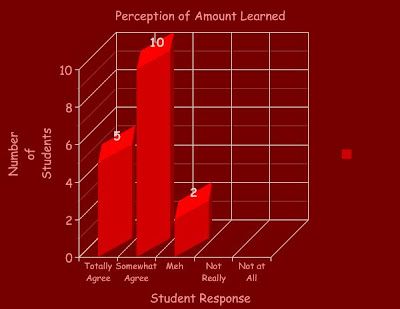Now, years later, I have come to understand that being a good teacher is as much about building relationships with students while modeling determination, curiosity, compassion, and helping others through the process of learning. I am constantly learning new things from my students. Here are six things they have taught me.
Don’t take yourself too seriously. I don’t think you can be an effective teacher if you aren’t willing to make mistakes in front of your students and laugh at yourself. When I first started teaching I wanted to make sure my students knew I was in control of the classroom. I had great classroom management, but very little classroom empowerment. Now I am much more comfortable allowing my students to see me as a fellow flawed human. There is a culture of respect in my classroom. I respect my students, they respect me, and they respect each other. Within that culture, we understand each of us makes mistakes on occasion, and that they are learning opportunities.
Passion is powerful. Years ago, when I was teaching 5th grade, I started shifting my classroom to be more focused on letting students learn through their passions. Instead of everyone reading the same non-fiction text to learn our reading standards, students were able to choose books on topics that interested them. Instead of each student having to write a persuasive essay on a prompt that I gave them, they were able to blog about an issue they cared about and publish it to a global audience. As they were able to discover and pursue their passions, they became more engaged in learning. They also helped me see how important it was to pursue my passions and to use my voice to share them with others.
Autonomy is necessary for empowerment. When we find ways to give autonomy to students in the learning process they flourish. I’ve seen this many times in my own classroom, but the example that sticks with me happened during a visit to the HIP Academy in rural western Kenya less than 2 weeks after the school opened. I brought with me some donated tablets and an internet connection. The teachers told me that few of the students had ever seen a screen before I arrived. During my visit I facilitated a Skype call between those children and 2nd grade students in Australia. I told the Kenyan children that they were in charge of teaching the Australians the names of different animals in Swahili. After a few moments of nervousness, the HIP students began to shine with confidence as they picked up stuffed animals and taught their new friends. Being given the chance to be in charge of the call allowed those students to take ownership of the lesson.
You can’t change the world if you don’t know much about it. I teach in the small, rural town where I have lived almost my entire life since I was 11 years old. Like all teachers, I want my students to believe that the learning that happens in school matters, and that they can use it to change their world for the better. I have learned to give them opportunities to see beyond our school walls and make a difference in their local and global communities by connecting with community members and using videoconferencing tools like Skype. As a result, my students have taught me how those experiences allow all of us to see ourselves as interconnected like never before.
Everybody has the capacity to impact their community for the better. Each time we collaborate with a scientist, astronaut, park ranger, international teacher, or group of students from around the globe, it is a great learning experience for students. So many times those connections have inspired my students to develop ways to make the world a better place. They have designed and fund-raised to build a bridge in Africa so that students could go to school. They have started gardening projects to grow produce for the local food pantry. They have worked to provide clean drinking water for children in the Kibera Slum of Nairobi. They have stopped using plastic straws in the cafeteria in an attempt to save penguins from plastic pollution. Through these student-driven projects and so many others, I have learned that children of any age or background can make their world a better place if given the opportunity.
Teaching is the greatest job in the world. Again and again, my students have taught me that there is no better job on the planet than being a teacher. Teaching is an emotional roller-coaster. Because we care about our students so much, we experience the joys of success with them and the pangs of failure. We deal with the anguish when there are situations out of our control that cause our students pain, and we rejoice when we watch them overcome obstacles to reach their potential. But, we get back so much more than we put into it. Each day we are with our students, we have the opportunity to make the world just a little better for each of them. More importantly, we get to teach them how to affect positive change and feel the joy of doing good for others. Over the years, my students have taught me how lucky I am to get the opportunity to love them and to watch them grow.
















